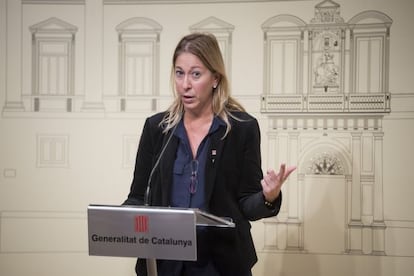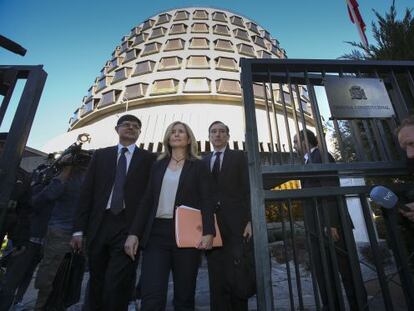Constitutional Court votes to suspend Catalan independence process
Spain’s top tribunal warns members of parliament that they must abide by the ruling But regional government vows to push forward with secession plan

As expected, Spain’s Constitutional Court on Wednesday unanimously agreed to temporarily suspend a separatist motion approved by the Catalan parliament to begin a unilateral breakaway from Spain.
The court is also issuing a warning to 21 high-ranking Catalan officials: “You are advised of your duty to prevent or halt any initiative that entails ignoring or bypassing the suspension, and warned about the responsibilities, including penal ones, that you could be held liable for.”
However, the country’s top tribunal stops short of telling these officials that they could be suspended from their public duties, as the central government wanted it to do.
The Constitutional Court now has five months to reach a decision on the matter of the separatist motion, or to prolong the stay indefinitely.
But this latest legal setback is not likely to alter the Catalan government’s plans.
For one thing, the separatist motion approved on Monday specifically said that “this parliament and the process of democratic disconnect [from Spain] is not beholden to decisions by the Spanish state’s institutions, in particular the Constitutional Court, which [this parliament] considers delegitimized.”
The acting deputy premier, Neus Munté, has said as much.
“The political will is to push forward the parliament’s mandate and the resolution that was approved on Monday,” she said, adding that the text was democratically approved following a parliamentary debate. According to Munté, this gives the controversial motion “full legitimacy.”
While Munté avoided using the world “disobedience” to describe the decision to ignore Spanish state institutions, she underscored that the Catalan government owes obedience to the Catalan parliament, where “sovereignty” resides.
She also said that this latest appeal to the Constitutional Court by the central government of Mariano Rajoy, of the Popular Party, evidences “a partisan use of the justice system to gag Catalan citizens’ desire for democracy and freedom.”
Regarding Rajoy’s own argument that he is defending democracy and the rights of all Spaniards, Munté asserted that “democracy is not at stake in Catalonia.”
But even if the Catalan government presses on with its plans, it will not find it easy to take the next step: drafting and passing three new laws, including one to create a Catalan social security system and one to set up a Catalan tax system.
Despite the outward show of unity, the separatist camp is deeply divided, and acting premier Artur Mas has failed to secure enough support, even from his fellow secessionists of the CUP party, to secure a new term in office following the regional elections of September 27.
Mas has a second chance at convincing CUP members to support him on Thursday, when the second investiture debate is scheduled to take place. But so far, the far-left, anti-capitalist group is refusing to back a figure they see as a symbol of corruption and social cuts in Catalonia. Instead, they want an independent, Raül Romeva, to take the helm.
If Mas does not get himself reinstated, a two-month period opens up when political agreement must be reached or new regional elections held – something which separatists want to avoid. In between, on December 20, Spain will hold a general election that could influence the Catalan independence process – and viceversa.
English version by Susana Urra.
Tu suscripción se está usando en otro dispositivo
¿Quieres añadir otro usuario a tu suscripción?
Si continúas leyendo en este dispositivo, no se podrá leer en el otro.
FlechaTu suscripción se está usando en otro dispositivo y solo puedes acceder a EL PAÍS desde un dispositivo a la vez.
Si quieres compartir tu cuenta, cambia tu suscripción a la modalidad Premium, así podrás añadir otro usuario. Cada uno accederá con su propia cuenta de email, lo que os permitirá personalizar vuestra experiencia en EL PAÍS.
En el caso de no saber quién está usando tu cuenta, te recomendamos cambiar tu contraseña aquí.
Si decides continuar compartiendo tu cuenta, este mensaje se mostrará en tu dispositivo y en el de la otra persona que está usando tu cuenta de forma indefinida, afectando a tu experiencia de lectura. Puedes consultar aquí los términos y condiciones de la suscripción digital.









































